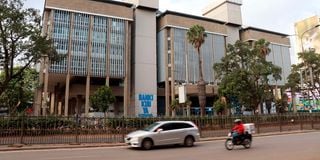Premium
First tranche of syndicated loan lifts Kenya's forex reserves

The Central Bank of Kenya, Nairobi. Kenya's forex reserves grew by Sh20.98 billion last week.
Kenya's forex reserves grew by Sh20.98 billion last week, signalling notable inflows of foreign cash that sources attributed to the arrival of the first tranche of a $500 million (Sh67.66 billion) syndicated loan.
Fresh data from the Central Bank of Kenya (CBK) shows Kenya's forex reserves jumped to $6.531 billion (Sh883.89 billion) in the week ended April 19, up from $6.376 billion (Sh862.91 billion) in the previous week.
Although this helped push the import cover of the reserves to 3.63 months up from 3.56 months the previous week, it is still below the legal threshold of four months of imports that the country's forex reserves should cover. Sources told the Nation that the initial $200 million from the syndicated loan, translating to about Sh27.06 billion, hit the State coffers last week, helping to shore up the reserves.
The sources said Kenya seeks to raise a lower Sh67.66 billion in a dual currency syndicated loan over the next few weeks down from the $600 million (Sh81.19 billion) initially planned.
The targeted syndicated loan arranged by Citigroup, Rand Merchant Bank, Standard Bank, and Standard Chartered Bank consists of a three-year tranche with a bullet payment and a five-year tranche that is amortising.
Typically, a bullet payment structured loan implies that upon maturity, a lump sum payment of any outstanding amount will be made at once by the debtor.
CBK governor Patrick Njoroge had earlier this month signalled that some external loans would hit government coffers before the end of April.
He indicated that among the inflows the State was expecting was $1 billion (about Sh135 billion) from the World Bank.
"We are expecting about $200 million (Sh26.47 billion) in very short order, we are expecting a World Bank disbursement, something in the order of $1 billion sometime by the end of April. We are expecting some more $400 million (Sh53 billion) along that same timeline," Dr Njoroge told a media briefing.
The structuring of the loan in a dual currency manner comes at a time when the government has stepped up efforts to address challenges related to the inaccessibility of the US dollar domestically, through a raft of measures, including a six-month-long government-to-government petroleum product importation arrangement.
The forex shortage has continued to pile pressure on the local currency, whose value dropped to a historic low of Sh135 against the US dollar on Thursday.
The continued weakening of the shilling defies President William Ruto's promise last month that government interventions would see the value of the local currency increase in two weeks.
The slump means the value of the shilling, which was exchanging at a mean of Sh113 at the start of January last year, has dropped by 20 per cent in just 16 months.





